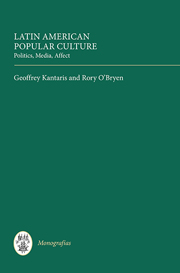Book contents
- Frontmatter
- Contents
- List of Illustrations
- Notes on Contributors
- Acknowledgements
- Introduction: The Fragile Contemporaneity of the Popular
- I Politics
- 1 ‘And where are the people?’ Genealogies of the pueblo during the Late Eighteenth and Early Nineteenth Centuries
- 2 Folktales and Fabulation in Lucrecia Martel's Films
- 3 How Popular is Cuban Popular Culture?
- 4 ‘El convertible no convertible’: Reconsidering Refuse and Disjecta Aesthetics in Contemporary Cuban Art
- II Media
- III Affect
- Index
1 - ‘And where are the people?’ Genealogies of the pueblo during the Late Eighteenth and Early Nineteenth Centuries
from I - Politics
Published online by Cambridge University Press: 05 October 2013
- Frontmatter
- Contents
- List of Illustrations
- Notes on Contributors
- Acknowledgements
- Introduction: The Fragile Contemporaneity of the Popular
- I Politics
- 1 ‘And where are the people?’ Genealogies of the pueblo during the Late Eighteenth and Early Nineteenth Centuries
- 2 Folktales and Fabulation in Lucrecia Martel's Films
- 3 How Popular is Cuban Popular Culture?
- 4 ‘El convertible no convertible’: Reconsidering Refuse and Disjecta Aesthetics in Contemporary Cuban Art
- II Media
- III Affect
- Index
Summary
The people have entrusted us with a mission and if we abandon it now, it would be a betrayal of the people.
Preliminary considerations
¿Y el pueblo dónde está? [‘And where are the people?’]. According to chroniclers, such was the question Julián de Leyva, procurator of the Buenos Aires Council, posed to Cornelio Saavedra on 25 May 1810, when American patriots called for the creation of an autonomous popular junta (Mitre 1859: 2530). The same accounts stress that ‘the people’ had been out on the streets all day but by night had already retired home. The popular mobilization was inscribed by nationalistic historiography as the birth of the nation and Leyva's question interpreted as engaging in delaying tactics against the revolution. This piece of historical cunning seems to have passed into popular folklore, as contemporary protests in Argentina often chant Si éste no es el pueblo ¿el pueblo dónde está? [‘If this is not the people, where are the people?’] (fig. 1.1).
In between these two appeals to the people, almost two hundred years apart, the popular emerged as the standard account for contemporary political modernity. However, some philosophers warn us that ‘the people’ has lost its conceptual impetus, both politically (to the pervasive effects of neoliberalism and, more generally, to that network of ruling powers that Negri and Hardt have called Empire [2000: xiv–xv]) and theoretically (to competing ideas of the multitude, post-hegemony, etc.).
- Type
- Chapter
- Information
- Latin American Popular CulturePolitics, Media, Affect, pp. 45 - 70Publisher: Boydell & BrewerPrint publication year: 2013



